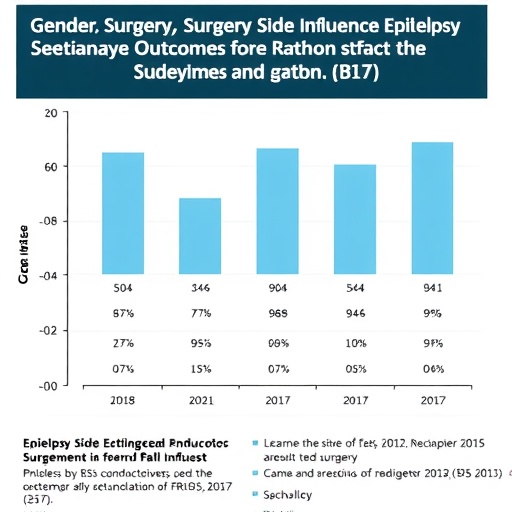Recent advancements in the field of epilepsy research have led to intriguing findings concerning the impact of surgery on cognitive and emotional outcomes in patients suffering from temporal lobe epilepsy (TLE). A recent study published by Cano-López et al. in the journal Biol Sex Differ delves into the nuanced effects of gender and the specific side of the brain on which the surgical intervention is performed. The research underscores the importance of considering these variables not just in clinical settings, but also in strategic planning for surgical procedures.
Temporal lobe epilepsy, a condition characterized by recurrent seizures originating in the temporal lobes, presents distinct challenges for both patients and healthcare providers. For many patients, surgical intervention represents a potential path to greater quality of life by reducing or eliminating seizure episodes. However, the complexity of brain functions means that such surgeries can carry additional risks, particularly concerning cognitive function and emotional well-being. This study sets out to illuminate those risks more clearly, offering essential insights into post-operative outcomes.
What the study revealed was particularly striking: gender and the lateralization of the surgical procedure appear to play significant roles in determining cognitive recovery, affectivity, and overall quality of life. Traditional approaches to surgical interventions have often overlooked these critical aspects, focusing instead on the technical success of surgery without sufficient regard to its holistic impact on patients. By highlighting these differences, the authors advocate for a tailored approach to surgery that incorporates these factors into clinical practice.
In terms of methodology, the study employed a prospective cohort design, allowing researchers to observe changes in patients over time. This longitudinal approach adds depth to the research findings, providing a more comprehensive view of how patients adapt post-operatively. Patients were assessed using a battery of neuropsychological tests aimed at measuring cognitive functions such as memory, attention, and language skills, as well as emotional health indicators. These measures enabled the researchers to draw correlations between surgery outcomes and the aforementioned variables.
The significance of gender was a focal point of the study. Previously, medical literature has often taken a one-size-fits-all approach, but this new research calls into question the validity of such practices. The study found that women and men exhibited differing patterns of cognitive recovery post-surgery. For instance, women seemed to experience more pronounced deficits in memory-related tasks compared to their male counterparts. This revelation paves the way for future studies that will further explore gender-specific approaches to surgical management.
Additionally, the side of the brain on which surgery was performed also bore weight on outcomes. The study presented evidence suggesting that patients who underwent surgery on the dominant hemisphere of the brain faced more challenges in recovery than those who had surgery on the non-dominant side. This finding is particularly relevant considering that the dominant hemisphere is typically responsible for critical cognitive functions such as language and analytical skills. A more nuanced understanding of these dynamics can lead to more informed patient counseling by healthcare professionals.
Importantly, the research also dove into the broader implications of its findings for post-operative care and rehabilitation. With the advent of more personalized medicine, there is a growing recognition of the need to tailor recovery programs to match individual patient profiles. The study’s authors argue for the integration of gender and lateralization data into rehabilitation protocols, suggesting that individualized plans may enhance recovery outcomes and improve quality of life.
The implications of the study extend beyond the individual patient level to encompass public health considerations as well. By understanding the sociodemographic factors that can influence surgical outcomes, healthcare systems may better allocate resources and develop targeted educational programs aimed at improving surgical success rates across diverse populations. This kind of proactive approach could lead to transformative changes in how epilepsy is managed at both community and institutional levels.
In summary, Cano-López et al.’s research offers critical insights into the dynamics of cognition, affectivity, and quality of life in the context of temporal lobe epilepsy surgery. The findings advocate for a more sophisticated understanding of how demographic factors influence surgical outcomes, and they highlight the importance of individualized care strategies. With potential implications for clinical practice, public health policy, and future research directions, this study provides a foundational step toward improving patient care in the realm of epilepsy treatment.
The call for increased awareness around the interplay between surgery type, gender, and cognitive outcomes is urgent. As more studies emerge in this space, it will be crucial for clinicians, researchers, and public health officials to remain engaged with the evolving landscape of epilepsy treatment. Ultimately, the goal is clear: to enhance the quality of life for thousands of individuals battling epilepsy, one surgical intervention at a time.
Understanding these dynamics may also inspire further inquiries into how various factors intersect in other neurological conditions, broadening horizons beyond epilepsy and potentially reshaping treatment protocols across a spectrum of related disorders. The journey toward complete patient-centered care continues, fueled by ongoing research and a commitment to better understanding.
Only through such rigorous examination and willingness to adapt can the medical community hope to foster an environment where patients not only survive but thrive after surgery.
Subject of Research: The impact of gender and side of surgery on cognitive, affective, and quality of life outcomes in patients undergoing temporal lobe epilepsy surgery.
Article Title: Impact of gender and side of surgery on cognition, affectivity, and quality of life in patients undergoing temporal lobe epilepsy surgery: a prospective cohort study.
Article References: Cano-López, I., Catalán-Aguilar, J., Hampel, K.G. et al. Impact of gender and side of surgery on cognition, affectivity, and quality of life in patients undergoing temporal lobe epilepsy surgery: a prospective cohort study. Biol Sex Differ 16, 87 (2025). https://doi.org/10.1186/s13293-025-00775-8
Image Credits: AI Generated
DOI: https://doi.org/10.1186/s13293-025-00775-8
Keywords: Temporal Lobe Epilepsy, Surgery, Cognition, Gender Differences, Quality of Life, Affective Outcomes, Neuropsychological Testing.




